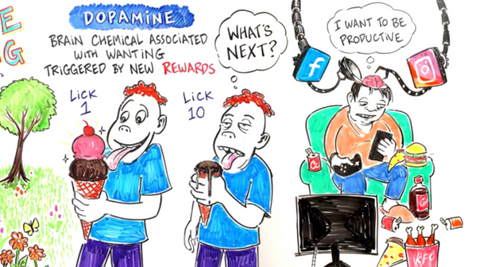Social network that desocializes and takes you away from yourself.

Reading time: 8 minutes.
This is not a text that aims to make oneself more guilty, but to observe oneself.
Because ...
When we observe each other, we understand each other a little better.
When we understand each other a little better, we know what we like.
When you know what you like, you know what you don't like.
When you know what you don't like, you make informed choices.
And an informed choice is a choice made out of reaction and automatism seeking solace and / or avoidance.
With intention & attention.
With presence & awareness.

Source: afterskool
We directed you to this page because we want to get away from where you were (fb, iG, tiktok, snap chat). We hope to pause your dopamine loop and bring a little bit of KOOL introspection . If you were at the start of your " dose " (you recently scrolled) maybe you feel an immense desire to leave this page and return to it? Especially because reading is less rewarding than gorging on videos of maybe your favorite sport because you wish you were that good?
Maybe some "social persona" that you aspire to be because of the recognition they receive (likes, views, followers)? Maybe topical to be up to date in your discussions and feel that you can belong and contribute to the heated conversations?
Maybe too cute animals because you need sweetness and a break from your shame and guilt-filled inner talk? Maybe some touching videos, your new passion for cooking, drinks, storage, decorations, tatts ... in short, the "maybe" are infinite, you never know what follows, but our brain is already anticipating the joy of dopamine and it will do everything to get you there.
When he fails to get you there without your knowledge, there may be guilt-relieving phrases to validate the impulsive behavior like "just go ahead! You could be drugging yourself! I haven't scrolled yet! Hey I'm really curious what happened at OD yesterday! etc., etc ". Your brain already knows it's going to prefer that to the cognitive effort of another task and the weight of responsibility that comes with it. Why ? Maybe it skyrockets the anxiety related to the fear of failure, of disappointment, of not performing and the fear that it is not perfect enough according to your illusory perception of perfection.
Unfortunately, social media stimulates our brains a little too much. There is so much different information that it is impossible to integrate, prioritize and to classify all that. It’s just inhumane. The algorithm gets to know you better than yourself. Scary to say, but it is. You can, because you teach him through your behaviors. Everything is studied, classified and adjusted to your profile; each click, zoom, duration on a type of post and each search. All of this is not done by a human, but by the machine itself. The machine does not hesitate, it is programmed to program you. She has no moral sense or concern for your internal well-being.She doesn't say to herself with a hint of remorse, "yeah, if I just show her what this person seems to like maybe she'll become addicted to and a slave to instant gratification?"
Maybe she will regress in her social skills? Maybe she will place more importance on her image and maybe that will pull her into a destructive loop of unnecessary pressure, comparing to the "best" moments arranged by virtual people and her esteem will end in stew. . ”

Source: afterskool
Social networks provide relief, temporarily, but it really feels good. That's what we think, because it leaves aside our need to perform which is made too scary to face. Sometimes we don't take the time to question ourselves how we feel about our responsibilities, to discern and rectify the pressure we put on a certain task. Sometimes it's the internal discourse that begins to dictate our actions with little love, aiming for a result no less than perfect, like everything we see on social media. And most importantly, we want to see this result with a single gesture, like a click.

Source: afterskool
This is how one fine morning you realize that you are effective, but very ineffective. Efficiency here refers to being good at something. Something useful? Therein lies the dilemma. For example, you are made excellent at understanding / talking about something that you are passionate about or close to your heart. Perhaps to take place in a social cause, to explain everything that is not done correctly (gender equality, sex, ethnicities, environment, politics) and to claim compensation and / or censorship. On the other hand, in effectiveness which refers to a real and concrete effect, we realize that we are sometimes missing our responsibilities and our priority tasks.
It's not your fault. The culprits are the leaders who have prioritized money over human well-being. It’s the fault of those who created these algorithms and machines. It's the performance culture's fault ... It's not your fault and you didn't choose to develop this addiction, but you are responsible for how you react, once you notice yourself the extent and impact of your behavior.
Does that mean to go to war? That they have to pay for what they do in our society? I don't know, I'm just thinking out loud. What I think is that hatred, hostility and revenge are leading to the culture of compensation right now and taking us further and further away from each other, it's pretty obvious in the news. Suppose those behind social media admit their wrongs and try to right them, we the “victims” of technology will never be sated. In my opinion, the greatest act of rebellion will be in detaching and taking control of our actions in love. Love of self and love of others . Thus, to carry in each of our exchanges an alternative posture filled with compassion, curiosity because we travel all our paths with different backgrounds and at different rhythms. We could teach ourselves with openness and vulnerability.
WHAT you do, matter much more than HOW MUCH you do and especially HOW it results (how perfectly done to your unrealistic standards). I'm writing it here to actually remind myself of it.It's a daily struggle, with myself and that's what's weird, isn't it? Having to fight against his behavior?
This article is opinion piece, even testimonial. It is not a substitute for professional medical advice and is full of my own biases. I don't want to generalize the impact of social media on people. It is a much more complex social problem than what is in this short article. What is certain is that I invite you to share if you have found the reflection relevant and especially to share yourself how social networks impact you on a daily basis. Sharing is giving someone else the space to see themselves through your experience, maybe even to put words into what they were experiencing without knowing it.
R.in
Regarde.in
Ræssemble.in
Sources and links to explore:
https://www.aide.ulaval.ca/psychologie/textes-et-outils/difficultes-frequentes/la-cyberdependance-quand-internet-prend-les-commandes/
https://cyberdependance.ca/
Work less & me more productive - tim ferris
https://youtu.be/GhFOSO15vf0
Millenials in the workforce.
https://youtu.be/QXWNChoIluo
Dopamine fasting 2.0 - overcome addiction & restore motivation.
https://youtu.be/jCWADjUA9iI
The beginning of human regression? - Guillaume Dulude.
https://youtu.be/2huKMKSDjDs
How childhood trauma leads to addiction - Gabor Maté.
https://youtu.be/BVg2bfqblGI
.

